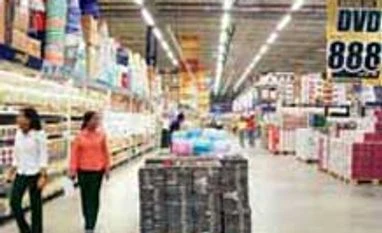The surprise repo rate hike announced on Friday is likely to dampen spirits of all those companies dependent on the festive period for a sizeable proportion of their sales.
Consumer durable players such as LG, Samsung, Panasonic, Haier, Godrej Appliances and Videocon say they expect sales growth to taper to levels of about 8 to 10% from 15-20% they had factored in earlier for the October-November period, key months in the festive calendar.
Almost 30% of sales for consumer durable and electronic companies happens during the festive perod, which stretches from Onam in August/September to Dussehra and Diwali in October/November.
More From This Section
While Onam, which was celebrated on September 16, saw a good response from consumers in Kerala, owing largely to pent-up demand as well as a general feeling of optimism of an economic recovery, the 0.25% repo rate hike announced immediately after, appears to have hit sentiment badly.
Saurabh Baishakhia, business head, air conditioners, LG Electronics India, admitted that consumers would be cautious during the festive period this year. "As such consumers were just beginning to feel that the dark clouds of inflation and lack of growth would dissipate with the stock markets looking up and the rupee appreciating. That sense of hope has vanished for now. I don't expect consumers to splurge this festive," he says.
Rajeev Jain, business head, appliances, LG Electronics India, also said that he expected consumers to be cautious this festive season. "We are yet to hear from Bajaj Finance on whether lending rates will move up following the repo rate hike," Jain says. "While it is still a bit early to say which way sales will head, but I expect the environment to be challenging," he says.
Almost 20 to 30% of overall consumer durables sales especially at the higher end is financed via EMI schemes. Typically manufacturers absorb the interest cost and other charges to make it affordable for consumers to purchase a product. While lending rates are expected to go up with the repo rate hike announced on Friday, companies say that they are not likely to bring down EMI schemes to minimise the impact on their margins.
A Samsung spokesperson says, "We will continue with our interest-free schemes since that is an attractive way in which consumers can own a Samsung product."
This point is echoed by all other players as well since zero-interest schemes form an important part of a company's sales pitch today. Manufacturers s are extending financing options in almost every category including mobile phones, where Samsung was the first to take the lead to finance purchase of its high-end mobile phones through EMI schemes. It has now been adopted by all key handset manufacturers including rivals such as Apple.
Companies say that they are working closely with retailers to push store-level discounts aggressively this festive season. Eric Braganza, president, Haier Appliances, says, "Promotional offers and discounts are likely to be aggressive this year as manufacturers as well as retailers try and convert footfalls into sales."
Home buyers cringe
While consumer goods companies are expected to go the whole hog this festive to push sales, real estate developers remain pessimistic following Friday's rate hike. "Much depends on how banks respond," says Rajeev Talwar, executive director, DLF. "If they raise rates before Diwali, there will be some impact on home sales. If they do it after Diwali, then people will get adjusted to it."
Pradeep Jain, chairman, Parsvnath Developers, says, "The move to hike rates is not a good signal for the realty segment which is going into festive season. Banks have already started raising their rates. This is going to hurt both buyers as well as developers."
According to Debopam Chaudhuri, vice-president, research, ZyFin (formerly BluFin), a Mumbai-based financial research and analytics company, consumers do not expect a significant decline in interest rates going forward. "Our research shows that consumers remain wary of inflation, which has taken a toll on their sentiment towards spending on durables, vehicles and homes," he says.
)